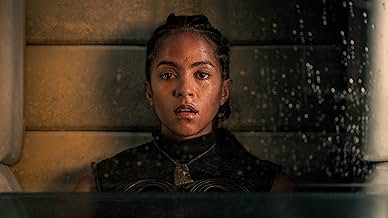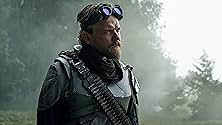Retrata a épica jornada de um grupo de humanos espalhados pelos planetas da galáxia, todos vivendo baixo as regras do Império Galáctico.Retrata a épica jornada de um grupo de humanos espalhados pelos planetas da galáxia, todos vivendo baixo as regras do Império Galáctico.Retrata a épica jornada de um grupo de humanos espalhados pelos planetas da galáxia, todos vivendo baixo as regras do Império Galáctico.
- Indicado para 2 Primetime Emmys
- 3 vitórias e 29 indicações no total
Explorar episódios
Resumo
Reviewers say 'Foundation' is a visually impressive sci-fi series with strong performances, especially from Lee Pace and Jared Harris. However, it faces criticism for significant deviations from Isaac Asimov's original books, including changes in character genders and storylines. Some viewers appreciate the modernization, while others feel it loses Asimov's essence. The series is lauded for its production values and epic scope but faulted for inconsistent writing and pacing. Non-book readers tend to enjoy it more, while original fans express disappointment.
Avaliações em destaque
When I read Asimov's 'Foundation' novels I was somewhere in my middle teenage years, more than 50 years ago. What I remembered was the central idea of psychohistory, but not much else.
When the first season of 'Foundation' screened in the Fall of 2021 I was deeply committed to the HBO series by Ridley Scott, 'Raised By Wolves' and the ambitious character driven political allegory 'The Expanse' airing on Prime. Both were challenging explorations into deeply complex ideas living up to the best that literary science fiction is known for.
Whatever my mood at the time, I found the first couple of episodes meeting most of my expectations, but then I seemed to loose the thread of the show as it left a central character behind and seemed to veer into a good guys versus bad guys realm of conventional space opera. I wrote a rather sour critique at the time that expressed my disappointment.
However, I started watching season two and decided to go back and review the first season. This time I was able to not only stay with the plot, but its choices made much more sense to me. I was newly impressed, to say the least, and could barely remember my specific criticisms on the first go-round.
Now I have a taste for what so many critics felt years after they first panned films like 'Blade Runner' and '2001:A Space Odyssey' before they recognized them as pioneering accomplishments. I wouldn't necessarily place 'Foundation' at the level of those films, but as an extended series it successfully tackles some profound questions about time and history and human behavior that are becoming ever more pertinent in today's climate of ongoing political crises.
The show runners project a run of 8 seasons to complete a narrative that even Asimov failed to finish. It'll be a remarkable achievement if all of the necessary factors, corporate, financial and otherwise hold up to make it to the end. Here's hoping.
When the first season of 'Foundation' screened in the Fall of 2021 I was deeply committed to the HBO series by Ridley Scott, 'Raised By Wolves' and the ambitious character driven political allegory 'The Expanse' airing on Prime. Both were challenging explorations into deeply complex ideas living up to the best that literary science fiction is known for.
Whatever my mood at the time, I found the first couple of episodes meeting most of my expectations, but then I seemed to loose the thread of the show as it left a central character behind and seemed to veer into a good guys versus bad guys realm of conventional space opera. I wrote a rather sour critique at the time that expressed my disappointment.
However, I started watching season two and decided to go back and review the first season. This time I was able to not only stay with the plot, but its choices made much more sense to me. I was newly impressed, to say the least, and could barely remember my specific criticisms on the first go-round.
Now I have a taste for what so many critics felt years after they first panned films like 'Blade Runner' and '2001:A Space Odyssey' before they recognized them as pioneering accomplishments. I wouldn't necessarily place 'Foundation' at the level of those films, but as an extended series it successfully tackles some profound questions about time and history and human behavior that are becoming ever more pertinent in today's climate of ongoing political crises.
The show runners project a run of 8 seasons to complete a narrative that even Asimov failed to finish. It'll be a remarkable achievement if all of the necessary factors, corporate, financial and otherwise hold up to make it to the end. Here's hoping.
Foundation is an intriguing sci-fi series that grows on you the more you watch it. At first, it can feel confusing-just as you're starting to get to know a character, they disappear, only to return much later, if at all. Then you're introduced to someone new, and the whole process of connecting with a character begins again. On top of that, events unfold across different locations, and the series makes massive jumps in time-particularly long ones between seasons.
I've completed Seasons 1 and 2. One of the show's strengths is that as each season progresses, the seemingly loose ends begin to tie together and make sense. Many odd or minor events and details-even from the very first episode-are only explained later in the season or in the finale. But if you keep your eyes and ears open, you might catch subtle clues that help you make sense of things as they unfold. Almost nothing is said without a reason. While Season 1 is built largely on suspense, Season 2 leans more toward action.
The series features numerous plot twists that help keep viewers engaged. Many come out of nowhere and aren't always happy or innocent-but that's part of the fun. In many ways, it resembles Dune, especially in tone and scale. However, one of Foundation's most distinctive traits is its pacing: at times, things move very slowly, only for the show to suddenly jump forward by decades, suggesting sweeping generational changes and the loss of familiar characters.
I've completed Seasons 1 and 2. One of the show's strengths is that as each season progresses, the seemingly loose ends begin to tie together and make sense. Many odd or minor events and details-even from the very first episode-are only explained later in the season or in the finale. But if you keep your eyes and ears open, you might catch subtle clues that help you make sense of things as they unfold. Almost nothing is said without a reason. While Season 1 is built largely on suspense, Season 2 leans more toward action.
The series features numerous plot twists that help keep viewers engaged. Many come out of nowhere and aren't always happy or innocent-but that's part of the fun. In many ways, it resembles Dune, especially in tone and scale. However, one of Foundation's most distinctive traits is its pacing: at times, things move very slowly, only for the show to suddenly jump forward by decades, suggesting sweeping generational changes and the loss of familiar characters.
To me Brother Day played by Lee Pace has become as enjoyable to watch as Daenerys played by Emilia Clarke in GOT. There's a lot of confusing, boring bits and vexing characters in the show but Brother Day keeps me coming for more.
Overall it's a quality show albeit flawed. But there's a lot of unique, and daring approach that still make this show worth a watch. Every scene and every new information that is revealed about Cleons is so engaging and interesting.
If you're into sci-fi I'd definitely recommend trying this show and giving it a shot at least till season two because it actually even improves in the second season.
Overall it's a quality show albeit flawed. But there's a lot of unique, and daring approach that still make this show worth a watch. Every scene and every new information that is revealed about Cleons is so engaging and interesting.
If you're into sci-fi I'd definitely recommend trying this show and giving it a shot at least till season two because it actually even improves in the second season.
I do not count myself an Asimov expert, nor had I been a big Foundation series fan during the first 2 seasons (though I did watch them). But this 3rd season has really caught my attention. Not meant as a knock on any of the prior show-runners or writers (I'm not familiar with the in's and out's within the prior production team(s)) but what I can say, being a sci-fi fan and television follower generally, is that Roxann Dawson is stellar behind the screen as a director and producer. Both in sci-fi/fantasy and more mainstream programming. While I thought she was great in Voyager as B'Lana, her work since behind the camera has been quite notable. And each time she gets involved with a series, like she has here, it thrives. Just sayin.
... Its name didn't need to be Foundation. Imo, it's about 50% Asimov and the rest is a combo of soap opera, sc-fi-imperial politics, CGI explosions and Webb-esque space vistas. Heck, you could claim several other writers' materials were influences. Lots of this series is purely mainstream, outer space SF.
But it's excellent SF! Captivating sub-plots, likable characters and gorgeous images are extremely entertaining! In its own right, it is a superb show. Aye, and there's the rub... A "show" isn't necessarily literature. Michael Crichton and James Patterson were/are graphic oriented writers, evoking a "screenplay" feel in their fiction, which isn't meant as a detraction. Excellent easy read authors! Asimov isn't as frugal a wordsmith, however, and there are probably as many different visual interpretations of scenes in his books, as there are readers of his books. But then again, this is series is just loosely "based" on his work, whether it is expressly acknowledged or not.
But it's excellent SF! Captivating sub-plots, likable characters and gorgeous images are extremely entertaining! In its own right, it is a superb show. Aye, and there's the rub... A "show" isn't necessarily literature. Michael Crichton and James Patterson were/are graphic oriented writers, evoking a "screenplay" feel in their fiction, which isn't meant as a detraction. Excellent easy read authors! Asimov isn't as frugal a wordsmith, however, and there are probably as many different visual interpretations of scenes in his books, as there are readers of his books. But then again, this is series is just loosely "based" on his work, whether it is expressly acknowledged or not.
New and Upcoming Sci-Fi and Fantasy
New and Upcoming Sci-Fi and Fantasy
From popular franchises to brand new worlds of exploration, science fiction and fantasy stories are more popular than ever. Check out our list of the best and brightest new and upcoming movies and series.
Você sabia?
- CuriosidadesAsimov's Foundation was originally published as a short story series in Astounding Magazine between May 1942 and January 1950, based on ideas in Edward Gibbon's History of the Decline and Fall of the Roman Empire.
- Cenas durante ou pós-créditosThe opening titles is a montage of radiant energy particles forming various shapes.
- ConexõesFeatured in Late Night with Seth Meyers: Paul Rudd/Jared Harris/Nate Smith (2021)
Principais escolhas
Faça login para avaliar e ver a lista de recomendações personalizadas
Detalhes
- Data de lançamento
- Países de origem
- Idioma
- Também conhecido como
- Фундація
- Locações de filme
- Empresas de produção
- Consulte mais créditos da empresa na IMDbPro
- Tempo de duração
- 1 h(60 min)
- Cor
- Proporção
- 2.00 : 1
Contribua para esta página
Sugerir uma alteração ou adicionar conteúdo ausente








































